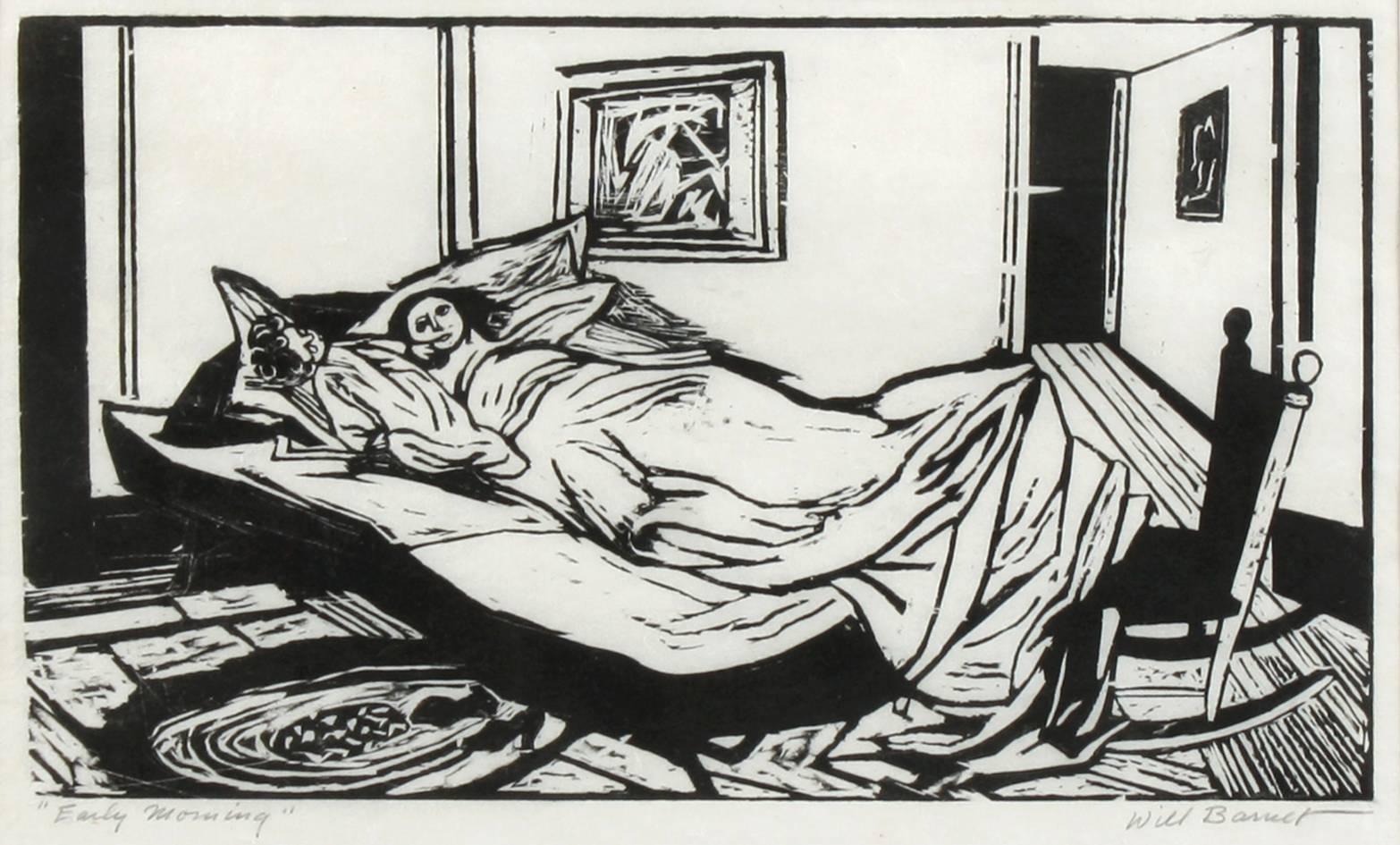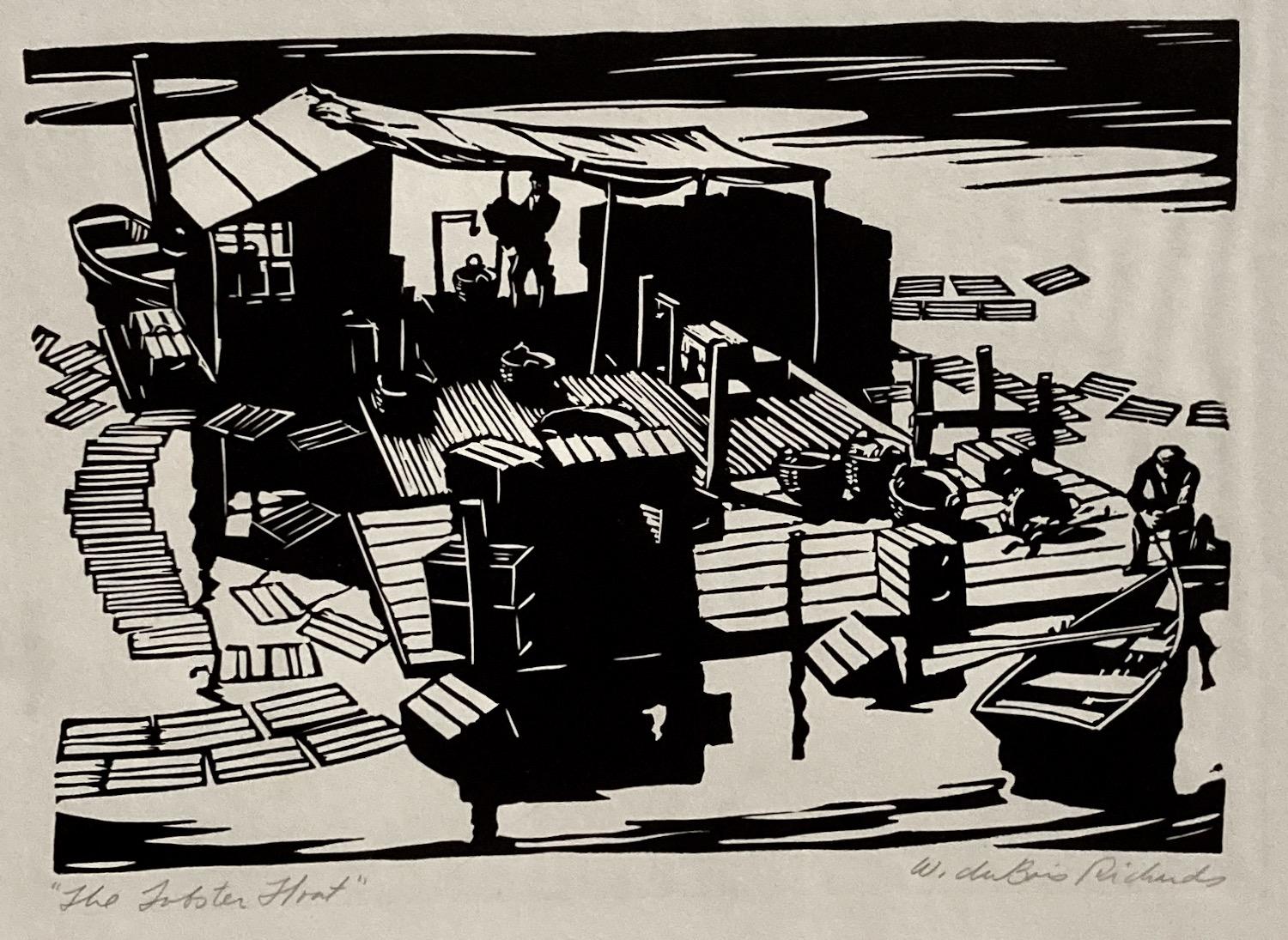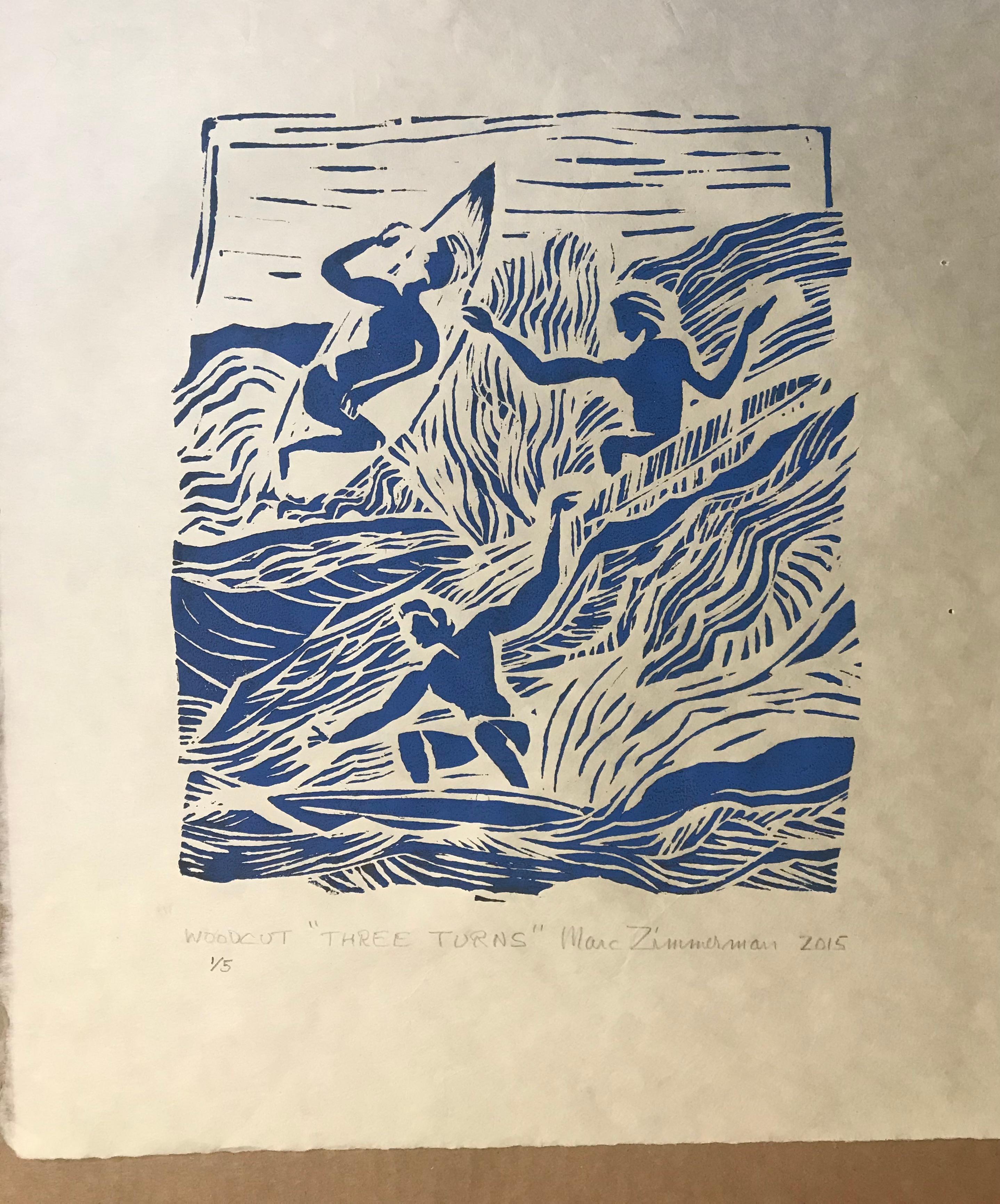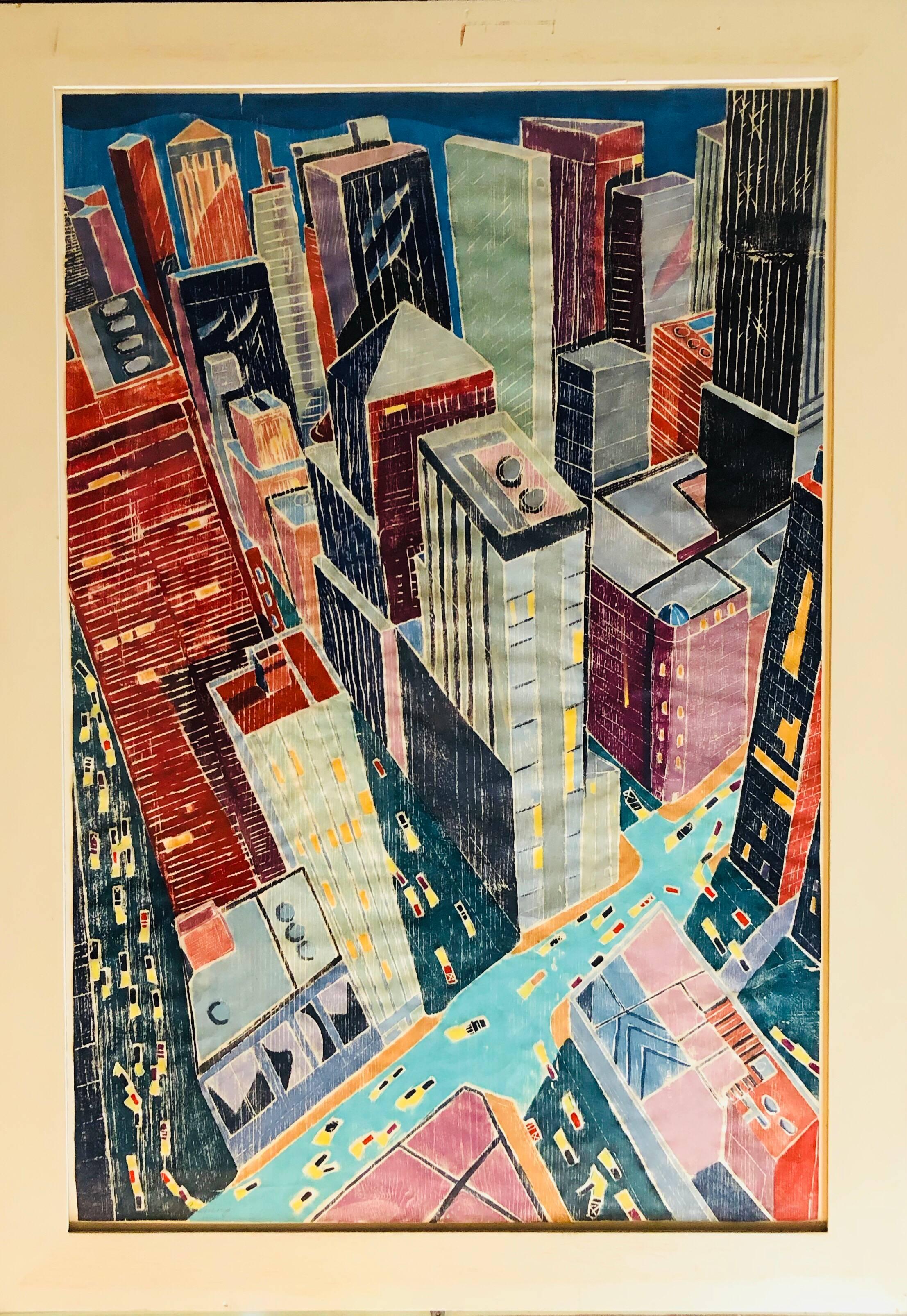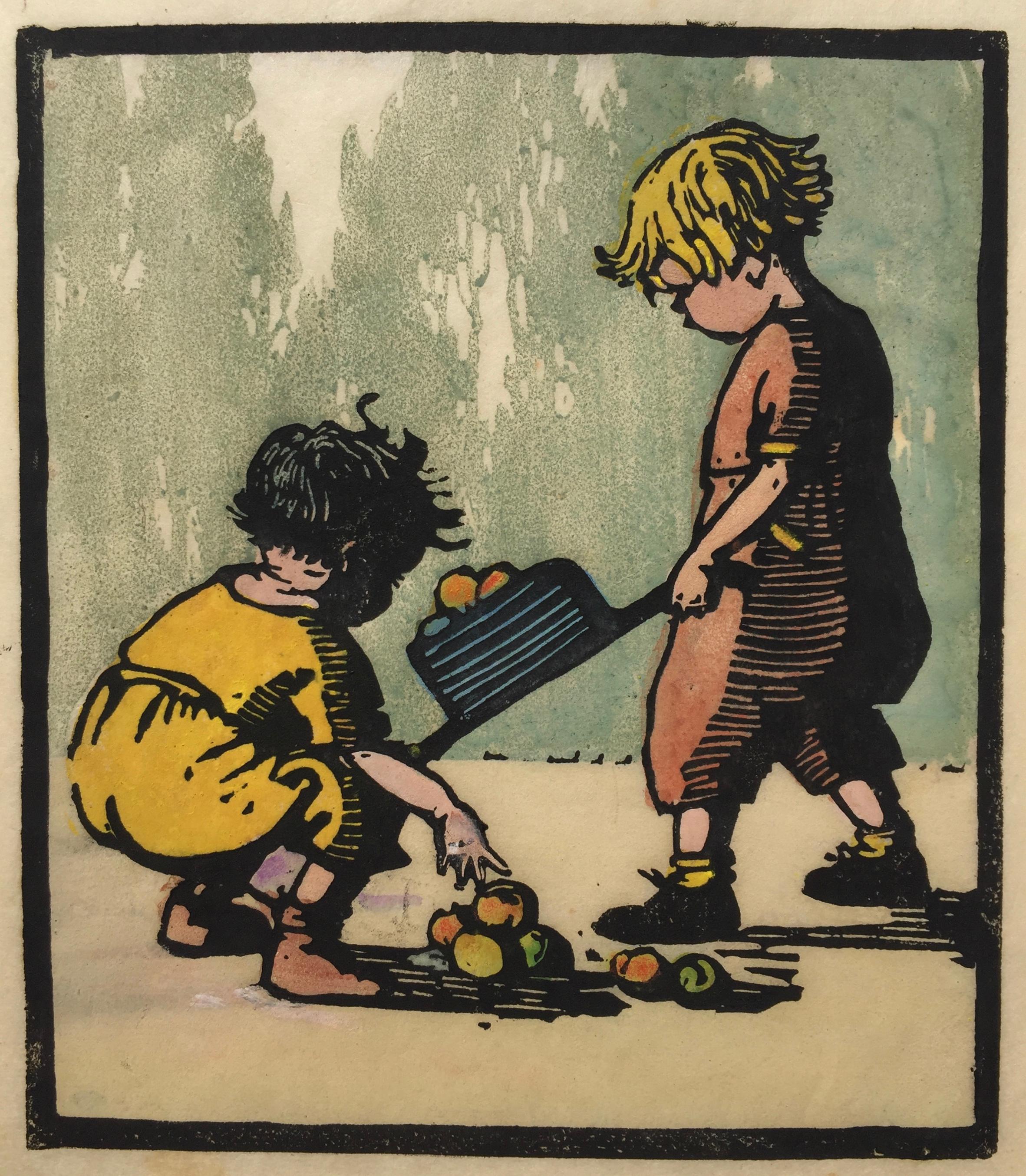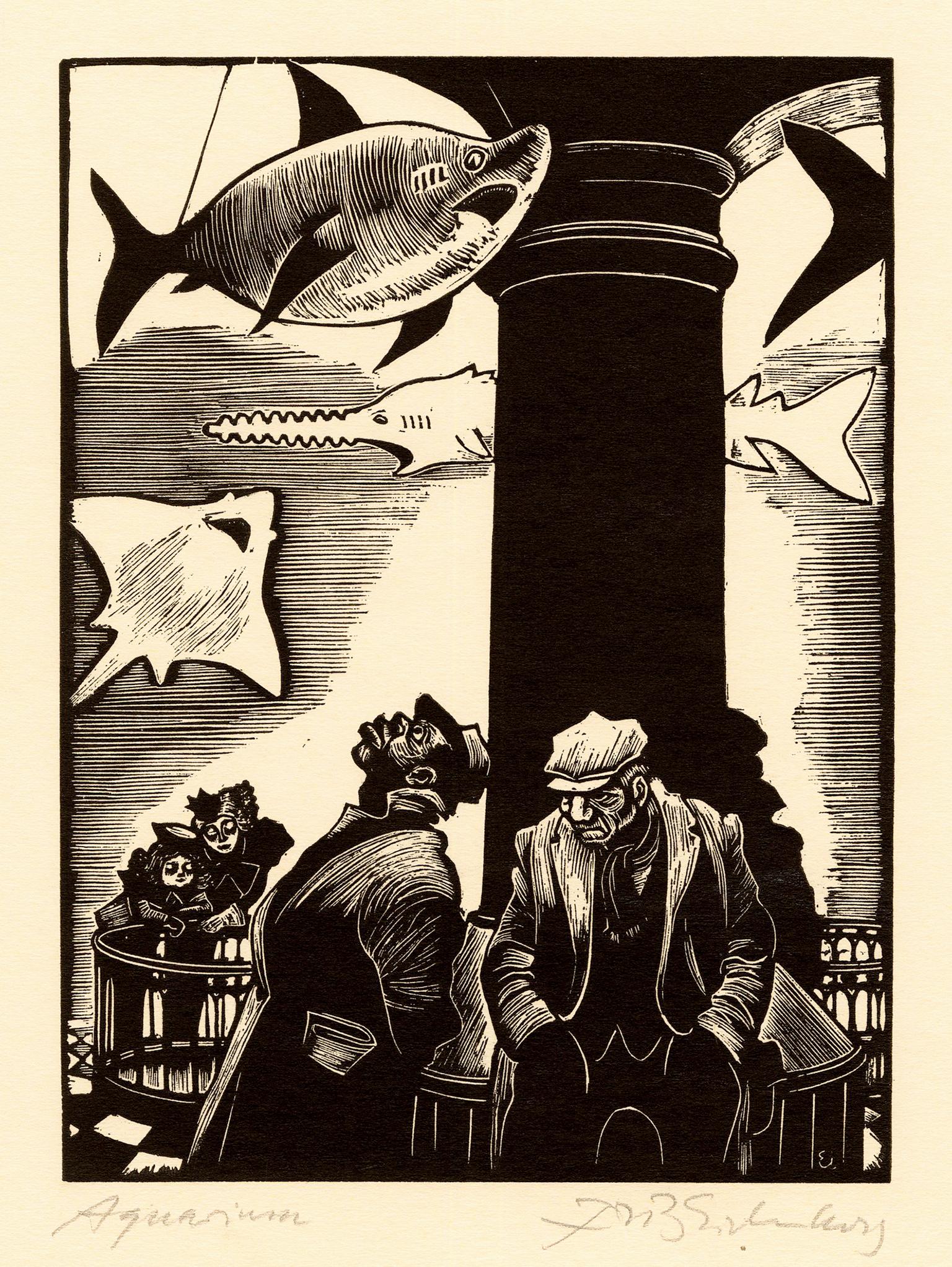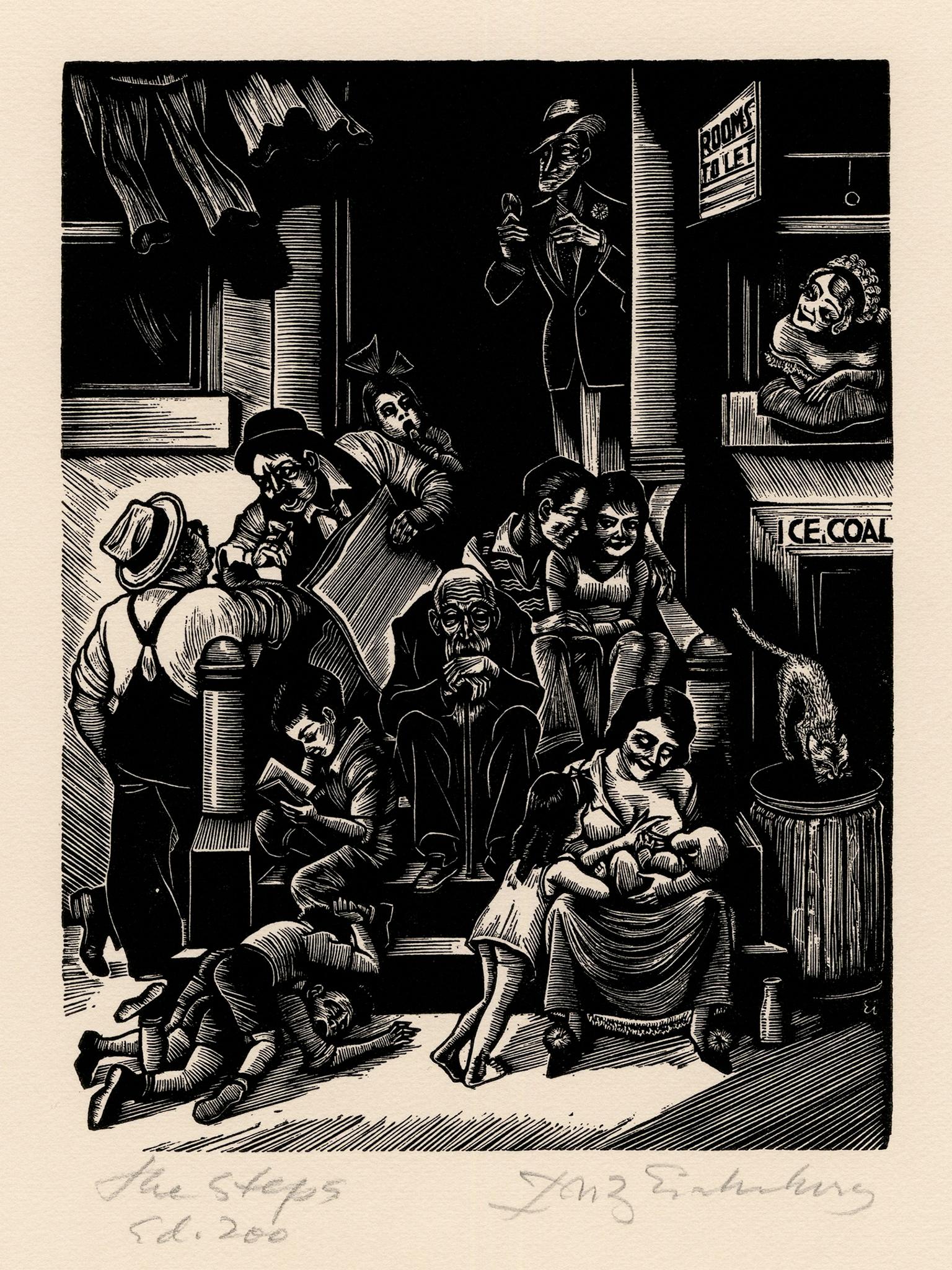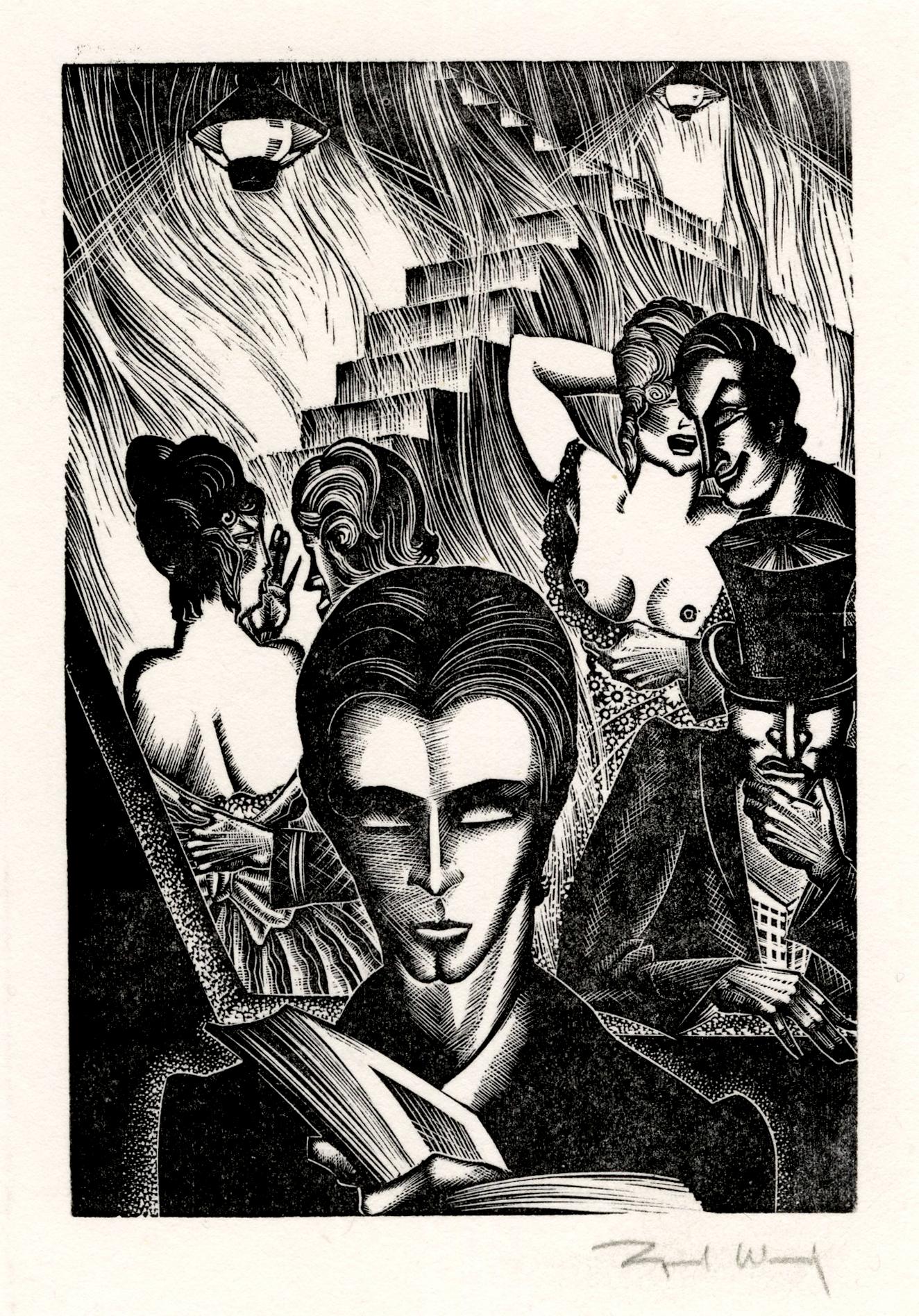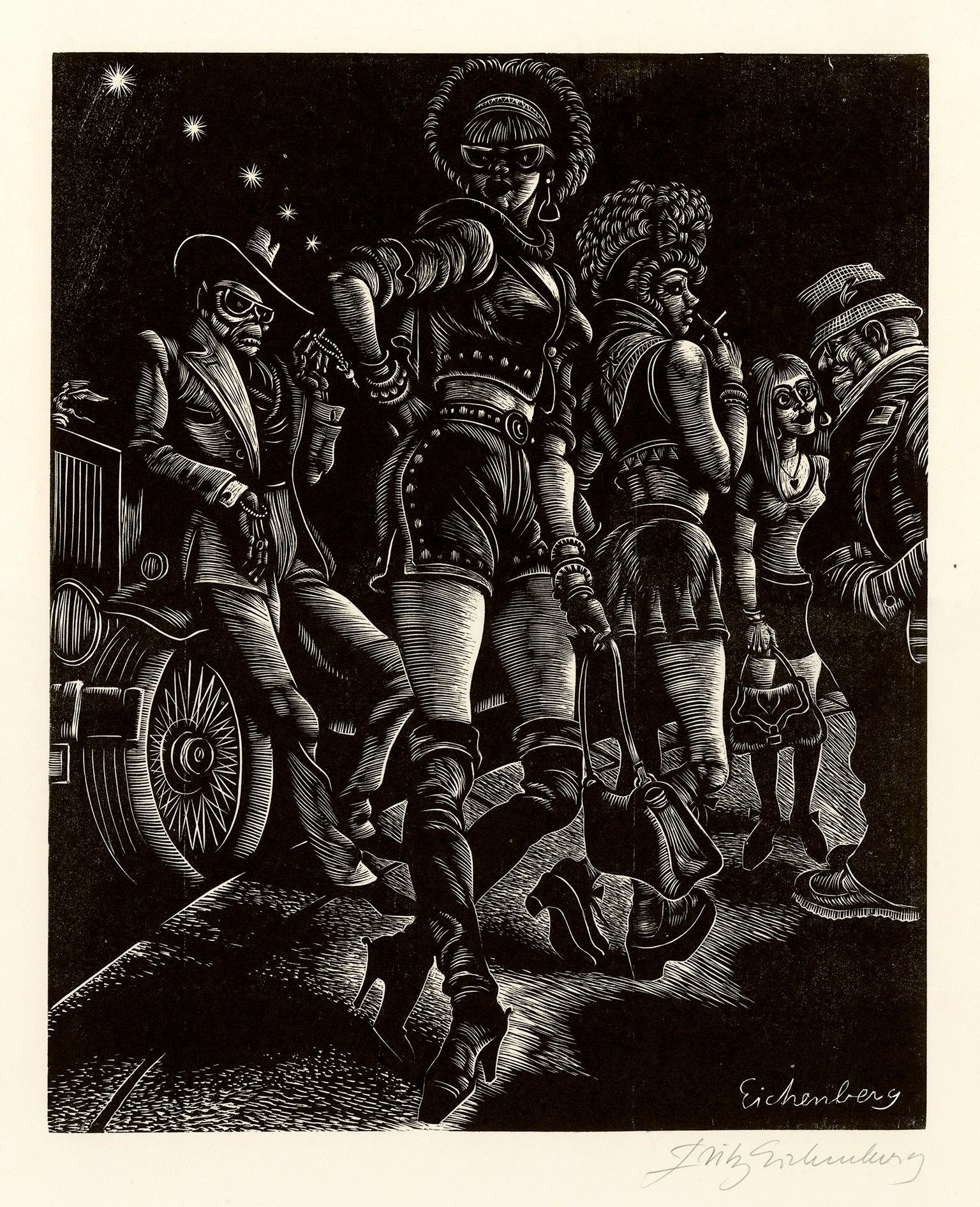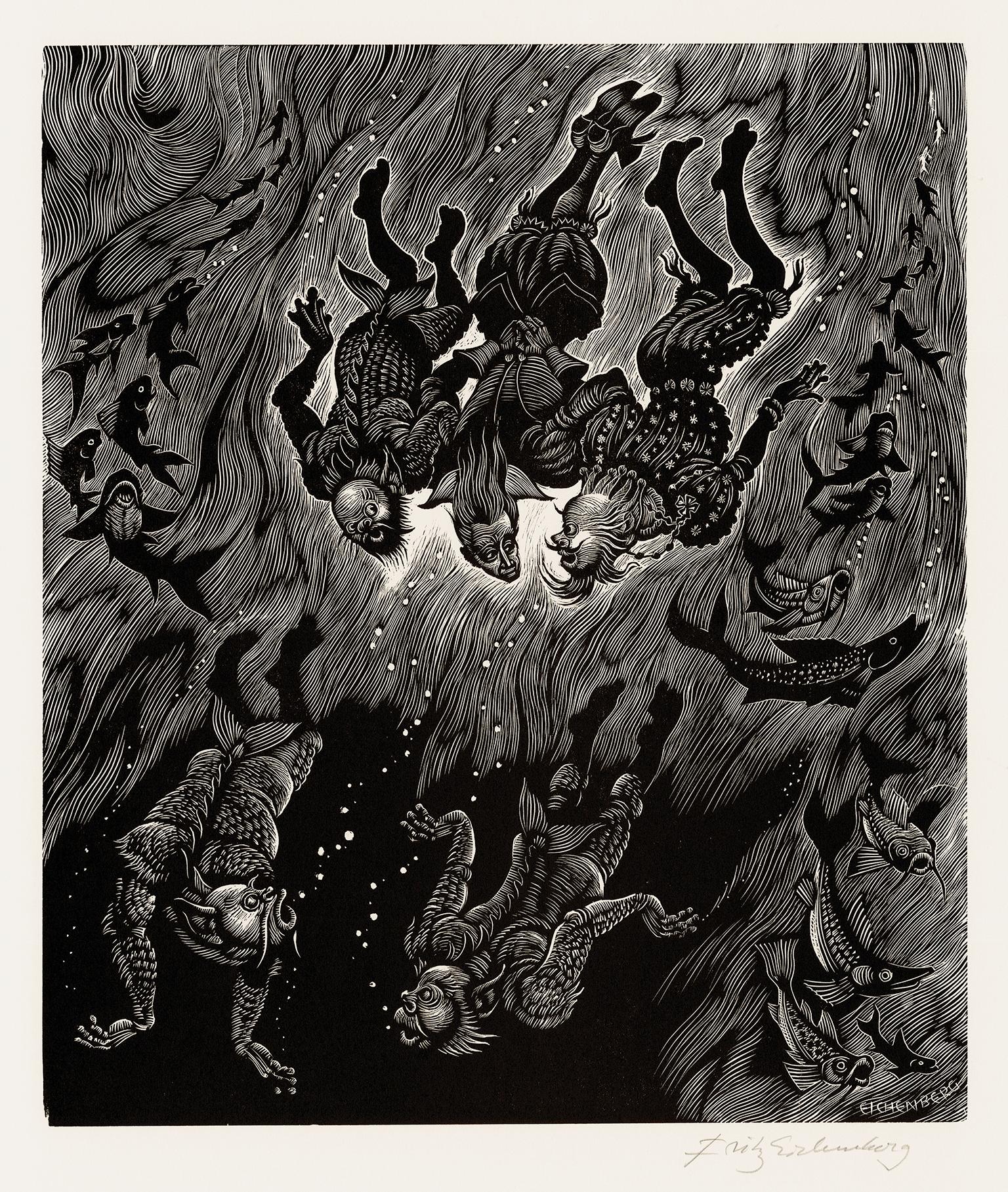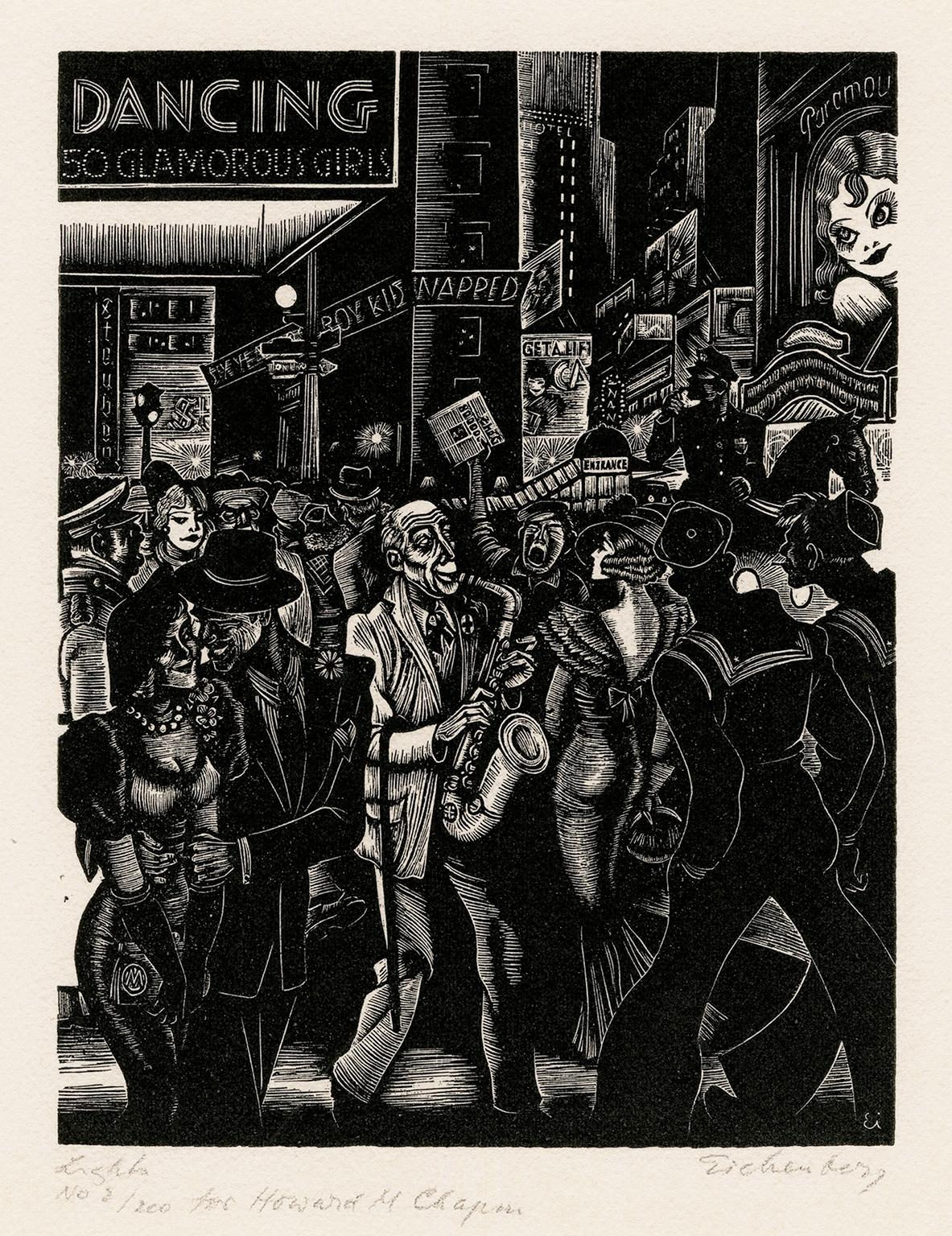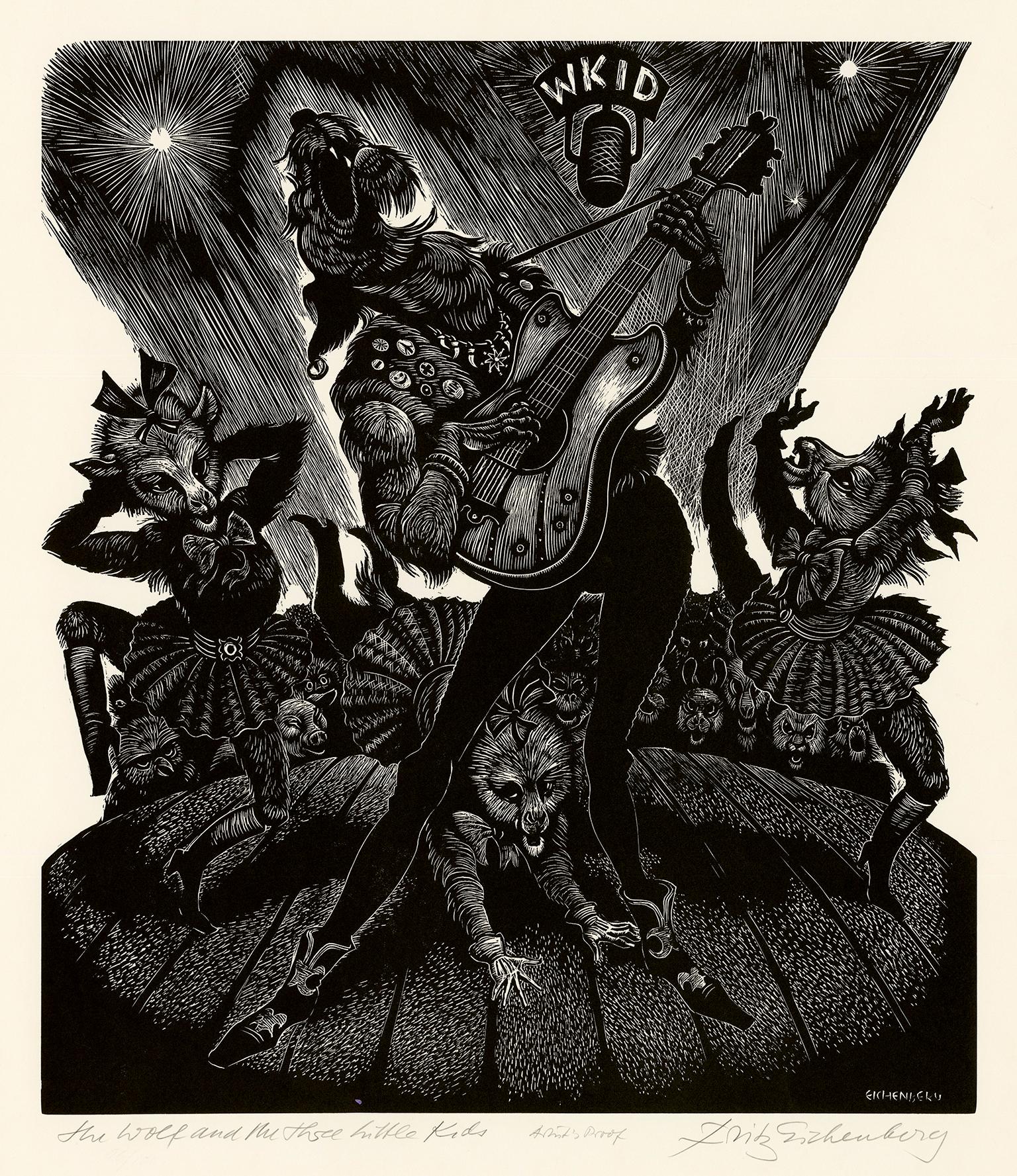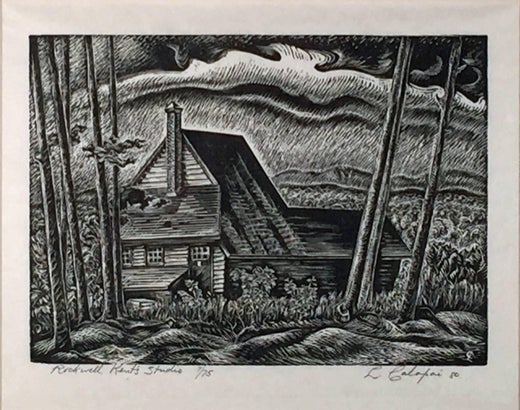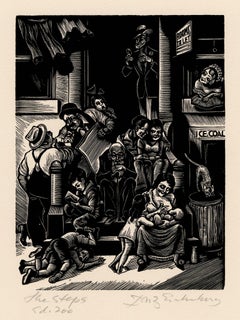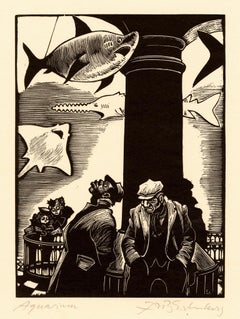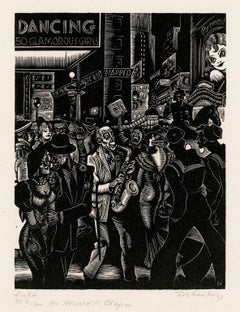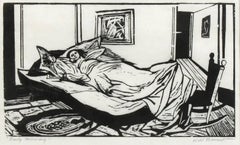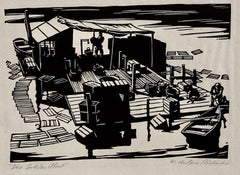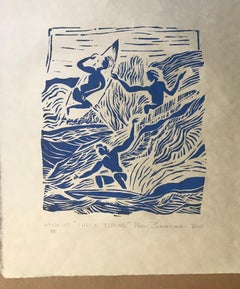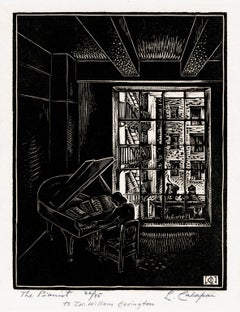
The Pianist
View Similar Items
Letterio CalapaiThe Pianist1941
1941
About the Item
- Creator:Letterio Calapai (1902 - 1993, American, Italian)
- Creation Year:1941
- Dimensions:Height: 7.57 in (19.23 cm)Width: 5.88 in (14.94 cm)
- Medium:
- Movement & Style:
- Period:
- Condition:
- Gallery Location:Myrtle Beach, SC
- Reference Number:Seller: 1038911stDibs: LU53236419522
Letterio Calapai
As American art of the 1930s and 1940s has become increasingly sought after, Letterio Calapai’s wood engravings have been rediscovered, and there is a growing realization that he was among the more distinguished artists working in this idiom during this period. Born in Boston, Calapai studied at the Mass. School of Art, the Art Students League, and the American Artists School. He was a student of Robert Laurent, Ben Shahn, and Stanley Hayter. From 1949–55, he was chairman of the Graphics Arts Department at Albright Art School at Buffalo and taught at the New School in New York from 1955-62. He was the founder and director of the Intaglio Workshop for Advance Printmaking in New York from 1960–65 and then became a professor of art at the University of Illinois.
(Biography provided by Harris Schrank Fine Prints)- 'The Steps' — WPA Era 1930s Graphic ModernismBy Fritz EichenbergLocated in Myrtle Beach, SCFritz Eichenberg, 'The Steps', wood engraving, 1933, edition 200. Signed, titled, and annotated 'Ed. 200' in pencil. Initialed in the block, lower right. A superb, richly-inked impr...Category
1930s American Modern Figurative Prints
MaterialsWoodcut
- 'The Aquarium' — WPA Era 1930s Graphic ModernismBy Fritz EichenbergLocated in Myrtle Beach, SCFritz Eichenberg, 'The Aquarium', wood engraving, 1933, edition 200. Signed and titled in pencil. Initialed in the block, lower right. A superb, richly-inked impression, on pale yel...Category
1930s American Modern Figurative Prints
MaterialsWoodcut
- 'City Lights' — Vintage Wood Engraving, New York City, 1934By Fritz EichenbergLocated in Myrtle Beach, SCFritz Eichenberg, 'City LIghts', wood engraving, 1934, edition 200. Signed, titled 'Lights', and annotated 'No 2/200 for Howard M. Chapin' in pencil. Initialed in the block, lower right. A fine, richly-inked black impression, on cream wove paper, with full margins (1 1/4 to 1 7/8 inches); a small loss (5/8 inch) in the top right sheet corner, well away from the image, otherwise in excellent condition. Printed by master printer Ernest Roth...Category
1930s American Modern Figurative Prints
MaterialsWoodcut
- 'Madman's Drum (Plate 41)' — 1930s Graphic ModernismBy Lynd WardLocated in Myrtle Beach, SCLynd Ward, 'Madman's Drum, Plate 41', wood engraving, 1930, edition small. Signed in pencil. A fine, black impression, on off-white tissue-thin Japan paper; the full sheet with margins (1 5/8 to 2 1/2 inches); a small paper blemish in the upper right margin, away from the image, otherwise in excellent condition. Scarce. Matted to museum standards, unframed. Image size 5 1/2 x 3 3/4 inches (140 x 95 mm); sheet size 9 5/8 x 7 1/8 inches (244 x 181 mm). From Lynd Ward’s book of illustrations without words, 'Madman’s Drum', Jonathan Cape and Harrison Smith, New York, 1930. Illustrated in 'Storyteller Without Words: The Wood Engravings of Lynd Ward', Harry Abrams, New York, 1974. Reproduced in 'Storyteller Without Words, the Wood Engravings of Lynd Ward', Harry N. Abrams, New York, 1974. ABOUT THE ARTIST Lynd Ward is acknowledged as one of America’s foremost wood engravers and book illustrators of the first half of the twentieth century. His innovative use of narrative printmaking as a stand-alone storytelling vehicle was uniquely successful in reaching a broad audience. The powerful psychological intensity of his work, celebrated for its dynamic design, technical precision, and compelling dramatic content, finds resonance in the literature of Poe, Melville, and Hawthorne. Like these classic American writers, Ward was concerned with the themes of man’s inner struggles and the role of the subconscious in determining his destiny. An artist of social conscience during the Great Depression and World War II, he infused his graphic images with his unique brand of social realism, deftly portraying the problems that challenged the ideals of American society. The son of a Methodist preacher, Lynd Ward, moved from Chicago to Massachusetts at an early age. He graduated from the Teachers College of Columbia University, New York, in 1926, where he studied illustration and graphic arts. He married May Yonge McNeer in 1936 and left for Europe for their honeymoon in Eastern Europe. After four months, they settled in Leipzig, where Ward studied at the National Academy of Graphic Arts and Bookmaking. Inspired by Belgian expressionist artist Frans Masereel's graphic novel ‘The Sun,’ and another graphic novel by the German artist Otto Nückel, ‘Destiny,’ he determined to create his own "wordless" novel. Upon his return to America, Ward completed his first book, ‘God's Man: A Novel in Woodcuts,’ published in 1929. ‘Gods’ Man’ was a great success for its author and publisher and was reprinted four times in 1930, including a British edition. This book and several which followed it, ‘Madman’s Drum,’ 1930, ‘Wild Pilgrimage...Category
1930s American Modern Figurative Prints
MaterialsWoodcut
- 'The Pimp' — Graphic ModernismBy Fritz EichenbergLocated in Myrtle Beach, SCFritz Eichenberg, 'The Pimp', wood engraving, 1980, artist's proof before the edition. Signed in pencil. Signed in the block, lower right. A fine, richly-inked impression, on cream wove paper, with full margins (2 3/16 to 3 1/2 inches), in excellent condition. Archivally sleeved, unmatted. Image size 12 x 9 3/4 inches (305 x 248 mm); sheet size 18 x 14 inches (457 x 356 mm). ABOUT THE ARTIST Fritz Eichenberg (1901–1990) was a German-American illustrator and arts educator who worked primarily in wood engraving. His best-known works were concerned with religion, social justice, and nonviolence. Eichenberg was born to a Jewish family in Cologne, Germany, where the destruction of World War I helped to shape his anti-war sentiments. He worked as a printer's apprentice and studied at the Municipal School of Applied Arts in Cologne and the Academy of Graphic Arts in Leipzig, where he studied under Hugo Steiner-Prag. In 1923 he moved to Berlin to begin his career as an artist, producing illustrations for books and newspapers. In his newspaper and magazine work, Eichenberg was politically outspoken and sometimes wrote and illustrated his reporting. In 1933, the rise of Adolf Hitler drove Eichenberg, who was a public critic of the Nazis, to emigrate with his wife and children to the United States. He settled in New York City, where he lived most of his life. He worked in the WPA Federal Arts Project and was a member of the Society of American Graphic Artists. In his prolific career as a book illustrator, Eichenberg portrayed many forms of literature but specialized in works with elements of extreme spiritual and emotional conflict, fantasy, or social satire. Over his long career, Eichenberg was commissioned to illustrate more than 100 classics by publishers in the United States and abroad, including works by renowned authors Dostoyevsky, Tolstoy, Charlotte and Emily Brontë, Poe, Swift, and Grimmelshausen. He also wrote and illustrated books of folklore and children's stories. Eichenberg was a long-time contributor to the progressive magazine The Nation, his illustrations appearing between 1930 and 1980. Eichenberg’s work has been featured by such esteemed publishers as The Heritage Club, Random House, Book of the Month Club, The Limited Editions Club, Kingsport Press, Aquarius Press, and Doubleday. Raised in a non-religious family, Eichenberg had been attracted to Taoism as a child. Following his wife's unexpected death in 1937, he turned briefly to Zen Buddhist meditation, then joined the Religious Society of Friends in 1940. Though he remained a Quaker until his death, Eichenberg was also associated with Catholic charity work through his friendship with Dorothy Day...Category
1980s American Modern Figurative Prints
MaterialsWoodcut
- 'A Visit to the King of the Waters' — Graphic ModernismBy Fritz EichenbergLocated in Myrtle Beach, SCFritz Eichenberg, 'A Visit to the King of the Waters' from the suite 'The Adventurous Simplicissimus', wood engraving, 1977, artist's proof apart from the edition of 50. Signed in pencil. Signed in the block, lower right. A fine, richly-inked impression, on cream wove paper, with full margins (1 1/2 to 2 inches), in excellent condition. Image size 14 x 12 inches (356 x 305 mm); sheet size 17 1/2 x 15 inches (445 x 381 mm). Archivally sleeved, unmatted. ABOUT THIS WORK 'Simplicius Simplicissimus' (German: Der abenteuerliche Simplicissimus Teutsch) is a picaresque novel of the lower Baroque style, written in five books by Hans Jakob Christoffel von Grimmelshausen published in 1668, with the sequel Continuatio appearing in 1669. The novel is told from the perspective of its protagonist Simplicius, a rogue or picaro typical of the picaresque novel, as he traverses the tumultuous world of the Holy Roman Empire during the Thirty Years' War. Raised by a peasant family, he is separated from his home by foraging dragoons. He is adopted by a hermit living in the forest, who teaches him to read and introduces him to religion. The hermit also gives Simplicius his name because he is so simple that he does not know his own name. After the death of the hermit, Simplicius must fend for himself. He is conscripted at a young age into service and, from there, embarks on years of foraging, military triumph, wealth, prostitution, disease, bourgeois domestic life, and travels to Russia, France, and an alternate world inhabited by mermen. The novel ends with Simplicius turning to a life of hermitage, denouncing the world as corrupt. ABOUT THE ARTIST Fritz Eichenberg (1901–1990) was a German-American illustrator and arts educator who worked primarily in wood engraving. His best-known works were concerned with religion, social justice, and nonviolence. Eichenberg was born to a Jewish family in Cologne, Germany, where the destruction of World War I helped to shape his anti-war sentiments. He worked as a printer's apprentice and studied at the Municipal School of Applied Arts in Cologne and the Academy of Graphic Arts in Leipzig, where he studied under Hugo Steiner-Prag. In 1923 he moved to Berlin to begin his career as an artist, producing illustrations for books and newspapers. In his newspaper and magazine work, Eichenberg was politically outspoken and sometimes wrote and illustrated his reporting. In 1933, the rise of Adolf Hitler drove Eichenberg, who was a public critic of the Nazis, to emigrate with his wife and children to the United States. He settled in New York City, where he lived most of his life. He worked in the WPA Federal Arts Project and was a member of the Society of American Graphic Artists. In his prolific career as a book illustrator, Eichenberg portrayed many forms of literature but specialized in works with elements of extreme spiritual and emotional conflict, fantasy, or social satire. Over his long career, Eichenberg was commissioned to illustrate more than 100 classics by publishers in the United States and abroad, including works by renowned authors Dostoyevsky, Tolstoy, Charlotte and Emily Brontë, Poe, Swift, and Grimmelshausen. He also wrote and illustrated books of folklore and children's stories. Eichenberg was a long-time contributor to the progressive magazine The Nation, his illustrations appearing between 1930 and 1980. Eichenberg’s work has been featured by such esteemed publishers as The Heritage Club, Random House, Book of the Month Club, The Limited Editions Club, Kingsport Press, Aquarius Press, and Doubleday. Raised in a non-religious family, Eichenberg had been attracted to Taoism as a child. Following his wife's unexpected death in 1937, he turned briefly to Zen Buddhist meditation, then joined the Religious Society of Friends in 1940. Though he remained a Quaker until his death, Eichenberg was also associated with Catholic charity work through his friendship with Dorothy Day...Category
1970s American Modern Figurative Prints
MaterialsWoodcut
- Early MorningBy Will BarnetLocated in Buffalo, NYA nice rare woodcut by the noted American Artist Will Barnet. This woodcut is from 1939 and is titled and pencil signed on the base "Early Morning", Will...Category
1930s American Modern Figurative Prints
MaterialsPaper, Woodcut
- Walter DuBois Richards, The Lobster FloatBy Walter DuBois RichardsLocated in New York, NYOhio-born Walter DuBois Richards (1907-2006) was educated at the Cleveland School of Art. He re-located to New York around 1933 where he had a successful career as a commercial artis...Category
1930s American Modern Landscape Prints
MaterialsWoodcut
- 3 Turns - Surfing Art - Figurative Print - Woodcut Print By Marc ZimmermanBy Marc ZimmermanLocated in Carmel, CAThree surfers carving up the Hawaiian waves, having a blast in the tropical surf. 3 Turns - Surfing Art - Figurative Print - Woodcut Print By Marc Zimmerman Limited Edition 01/05 ...Category
2010s American Modern Figurative Prints
MaterialsWoodcut
- City Evening, Large Scale Whiteline Woodcut New York City at Night ed. 25By Aline FeldmanLocated in Surfside, FLAline Feldman was born in 1928 and grew up in Kansas. She studied design and printmaking at Washington University in St. Louis under Werner Drewes and Fred Becker, respectively. She studied painting at Indiana University...Category
1980s American Modern Figurative Prints
MaterialsWoodcut
- FRUIT FOR SALEBy Frances H. GearhartLocated in Santa Monica, CAFRANCES H. GEARHART and Sisters (THE GEARHARTS) FRUIT FOR SALE c.1928 Color block print. Unsigned. This is an original block print from “Let’s Play”, an intended but unpublished children’s book done in collaboration with her sisters Edna and May in 1928. Image 8 x 7 inches. On a tissue thin laid paper. Irregular sheet 9 3/8 x 8 1/2. The entire series consisted of over 20 children's images. There were very few printed. The editions of the various children varied but likely no more than 50. This impression very well printed with good colors, Very good condition. The margins are likely as issued with the irregular edges. The margins and paper used for this series varies from one print to the next. A bit of tape remnants at top center sheet edge. A very nice example of this print. It is not unusual for impressions of this series to be unsigned, although many are signed "The Gearharts" The Provenance of this example is fascinating. It was acquired from a gentleman who knew the Gearharts as a child in the early 50's in Pasadena. It was part of a collection given to him by Frances. In his adult years he was in the military and took the collection with him as he traveled around Europe, After 81 years, based on the original prints, this book was published by the “California Book...Category
1920s American Modern Figurative Prints
MaterialsWoodcut, Linocut
$1,200 Sale Price20% Off - Portrait of Modern Man - Multilayer Woodblock in Ink on PaperLocated in Soquel, CAPortrait of Anger - Multilayer Woodblock in Ink on Paper Bold and saturated woodblock print of a screaming man by Michael Dow (American, 20th Century). The man is centered in this m...Category
1990s American Modern Figurative Prints
MaterialsPaper, Ink, Woodcut
$540 Sale Price20% Off
